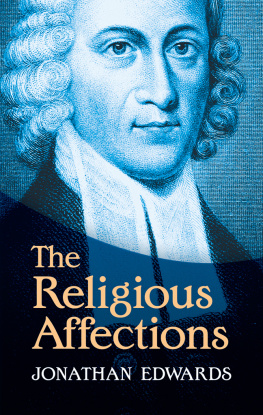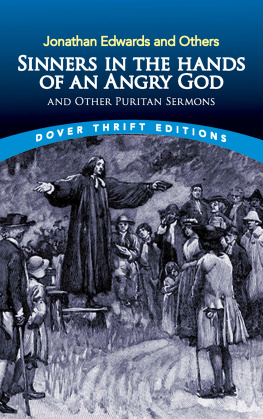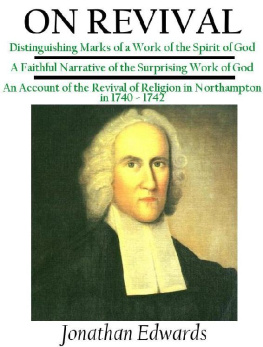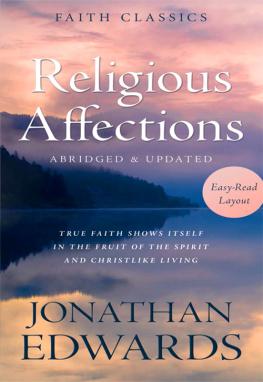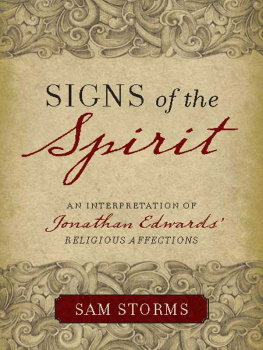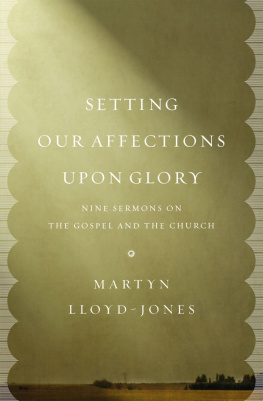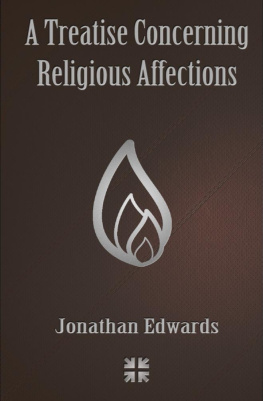Jonathan Edwards - The Religious Affections
Here you can read online Jonathan Edwards - The Religious Affections full text of the book (entire story) in english for free. Download pdf and epub, get meaning, cover and reviews about this ebook. year: 2013, publisher: Dover Publications, genre: Religion. Description of the work, (preface) as well as reviews are available. Best literature library LitArk.com created for fans of good reading and offers a wide selection of genres:
Romance novel
Science fiction
Adventure
Detective
Science
History
Home and family
Prose
Art
Politics
Computer
Non-fiction
Religion
Business
Children
Humor
Choose a favorite category and find really read worthwhile books. Enjoy immersion in the world of imagination, feel the emotions of the characters or learn something new for yourself, make an fascinating discovery.
- Book:The Religious Affections
- Author:
- Publisher:Dover Publications
- Genre:
- Year:2013
- Rating:4 / 5
- Favourites:Add to favourites
- Your mark:
- 80
- 1
- 2
- 3
- 4
- 5
The Religious Affections: summary, description and annotation
We offer to read an annotation, description, summary or preface (depends on what the author of the book "The Religious Affections" wrote himself). If you haven't found the necessary information about the book — write in the comments, we will try to find it.
In one of the unsurpassed religious masterpieces produced by an American writer, Jonathan Edwards distinguishes between true and false religion by defining a believers correct affections and explaining their importance. He further identifies the distinction between genuine-seeming and legitimate affections. Essential reading for divinity students and those studying American religious history.
The Religious Affections — read online for free the complete book (whole text) full work
Below is the text of the book, divided by pages. System saving the place of the last page read, allows you to conveniently read the book "The Religious Affections" online for free, without having to search again every time where you left off. Put a bookmark, and you can go to the page where you finished reading at any time.
Font size:
Interval:
Bookmark:
The
Religious
Affections
The
Religious
Affections
JONATHAN EDWARDS
Dover Publications, Inc.
Mineola, New York
Bibliographical Note
This Dover edition, first published in 2013, is an unabridged republication of The Religious Affections, first published in 1746. The material here is a reprint of the edition originally published by Banner of Truth Trust, Carlisle, Pennsylvania, in 2004.
Library of Congress Cataloging-in-Publication Data
Edwards, Jonathan, 17031758.
The religious affections / Jonathan Edwards.
p. cm.
This Dover edition, first published in 2013, is an unabridged republication of The Religious Affections, first published in 1746. The material here is a reprint of the Banner of Truth Trust, Carlisle, Pennsylvania, 2004 edition.
eISBN-13 978-0-486-31639-0
1. EmotionsReligious aspectsChristianityHistory of doctrines18th century. 2. Congregational churchesEarly works to 1800.I. Title.
BV4597.3.E39 2013
248.2dc23
2013003522
Manufactured in the United States by Courier Corporation
49102101 2013
www.doverpublications.com
CONTENTS
INTRODUCTION
BY universal confession of the princeliest leaders in the world of thought, Jonathan Edwards must be included among those whose gifts are of the supremest sort.
His most famous books, on the intellectual and theological side, were the product of his latest years. The Freedom of the Will, The Defence of the Doctrine of Original Sin, The Discussion of the Nature of True Virtue, The Treatise on Gods Last End in the Creation, were all written in the Stockbridge period of his life (1751-1758); and the majority of them were not published until after his earthly tasks were done, and his body had been laid to rest in the Princeton Churchyard. It was a polemical purpose which inspired these great worksthe purpose of refuting Arminianism. But, in themselves, they are among the monumental books of history. They have the incorruptible quality, the asbestos element, in them. A latent fire pulses and quivers under the acute and victorious and remorseless argument, and there is that in their pages which will keep them vital and vitalising so long as men crave great thoughts to live and die with.
The Freedom of the Will is, as Isaac Taylor said, a classic in metaphysics and, whether or no we admit its thesis that human liberty must live and move and have its being within the sphere of a divine determinism, it throws its spell over us. Mr. Lecky has condemned the treatise on Original Sin as one of the most revolting books that have ever proceeded from the pen of man but, when a shallow optimism beguiles us with its enchantments, and when life is painted, in M. Renans fashion, as an affectionate picnic and a delightful excursion through reality, we need the Puritanism of Edwards to remind us that things are not so far removed from disaster and tragedy, and that there is a far-reaching and deep-seated alienation which separates man from God. It may be that, in his consideration of the nature of True Virtue, he sometimes makes over-exacting demands of our frail and storm-driven humanity; but he is himself one of the high men who died in the pursuit of great things, and, when he depicts the love of God as the first beginning and the last end of our thoughts and words and ways, he portrays his own motive and his own goal. And as for creation, Edwards tells us that it is the unveiling of the divine glory, the publishing of some of the syllables in the august and adorable and blessed Name of God, the writing out in legible characters of a little of His matchless and unfathomable perfection. This man always walks on the sublimest levels. To us, who look up to him from far beneath, he seems to have his proper place among the cherubim who know.
But sometimes he draws nearer still to the sacred Presence and the gracious Face. He takes rank among the seraphim who burn. That is the peerless society in which we find him when we read The Religious Affections.
It is an older book than those others. It was published in 1746, and before that, it had been preached in a series of sermons to his congregation in 1742 and 1743;were they not a richly favoured people to listen to discourses which laid bare to them the mysteries of the Kingdom of Heaven? It was the Great Revival which gave birth to the book.
In the closing months of 1734, and all through 1735, when Edwards had been for some seven or eight years minister of his charge, the plenteous rains of the Holy Spirit began to fall on the souls he was so eager to instruct and bless. The town, he wrote, was never so full of love, never so full of joy and yet so full of distress, as it was then. Whenever men and women met, and it mattered nothing whether they were old or young, the talk turned on divine and eternal things. There were meetings in private houses as well as in the church. A profound and universal concern about religion took possession of the place. And through it all Edwards moved, his heart filled with thankfulness, and his mind intent on scrutinising these goings of God in His sanctuary. He noted that, first, the awakened consciousness was plunged into depths of gloom and fear. It realised that there was awful danger impending. Its whole energies were strained and bent to escape from the wrath to come. Then he saw the troubled soul learning to acknowledge the sovereignty of God, and to leave itself implicitly in His hands, and to confess its need of the mediation of Christ. And, by and by, after many confused strivings and many humbling discoveries, he beheld it arriving at the happy harbour of salvation, the storm changed into a calm at Gods command and will. These were the blessed sights he found on every side of him. He studied them, during that strange and glorious year of 1735, with the keen mental interest of the psychologist and the rejoicing gratitude of the bond-servant of Jesus Christ.
Then, to his great grief, the splendid vision faded into the light of common day. Worldliness and sin commenced to reassert themselves in Northampton. But, though the reign of grace had declined, there were signs that ere long it might return. For this Edwards waited and prayed and toiled; and God gave him the desires of his heart. In 1740, the Revival came back, like the reappearance of spring after a temporary and disheartening winter. This time it was destined to spread far beyond his own parish, through New England first, and then over the sea to Britain and the Continent of Europe. It became the wonderful spiritual quickening which we associate with the names of Whitefield and Wesley, as well as with that of Edwards. It had its blemishes and blunders, which its enemies magnified, and which stirred poignant regrets in its warmest friends. There were often alarming and disquieting bodily effects. There was an idea, which soon became too prevalent, that God and Christ and heaven and hell were revealed immediately to the soul; and thus men disparaged the written Word and the Spirits employment of it as His instrument. There were itinerant preachers who pushed themselves forward, and who frequently were very severe in their strictures on the Churchs ordained ministers. There was real danger that the settled order of Gods house would be overturned. These were mournful and mysterious flaws, and Edwards lamented their presence and wished to have them rectified. But about the work of God itself, its genuineness, its depth, its marvellous effects, he had no manner of doubt. Who that saw the state of things in New England a few years ago, he asks, would have thought that in so little a time there would be such a change ? The conscience of the people had been roused into a new sensitiveness. The young had laid aside their levity. The taverns were deserted. The wealthy had relinquished their vanities. The Bible was loved and pondered, and the Lords Day was religiously observed. Old quarrels were ended, and those who had been at variance were joining hands again in brotherliness and amity. Could these things be Satans spurious counterfeithis mirage which dazzled the eye and befooled the heart? Were they not Gods superhuman and irrefutable reality?
Next pageFont size:
Interval:
Bookmark:
Similar books «The Religious Affections»
Look at similar books to The Religious Affections. We have selected literature similar in name and meaning in the hope of providing readers with more options to find new, interesting, not yet read works.
Discussion, reviews of the book The Religious Affections and just readers' own opinions. Leave your comments, write what you think about the work, its meaning or the main characters. Specify what exactly you liked and what you didn't like, and why you think so.

